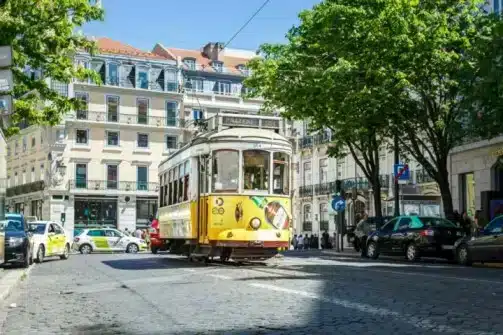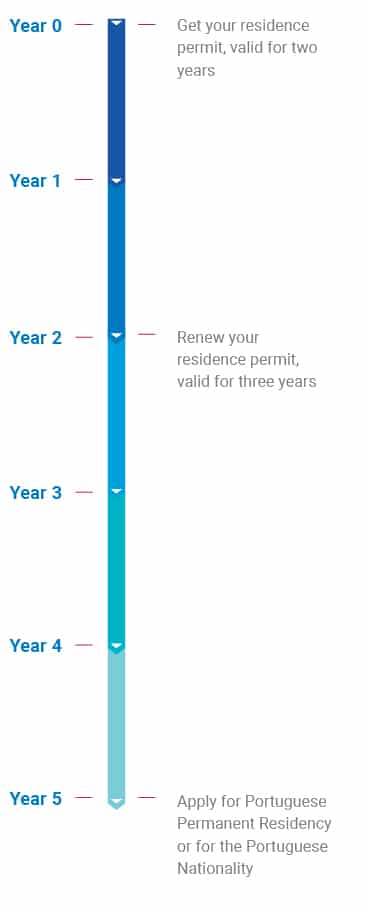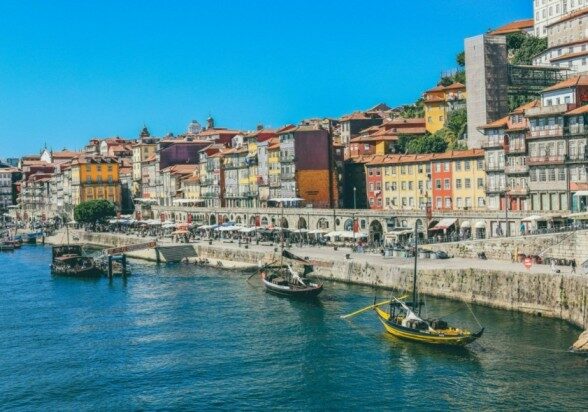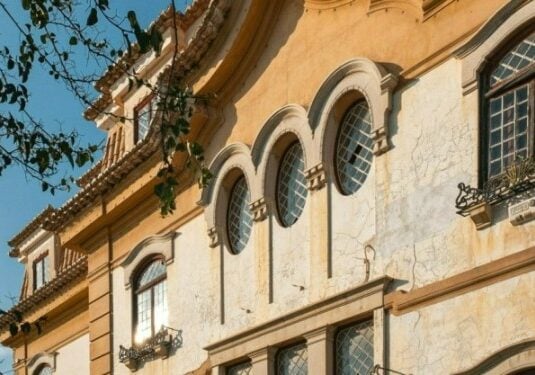Updated: July 10, 2025
Non-EU citizens looking to live in Portugal can apply for the D7 Visa if they have a stable passive income. Commonly known as the Portugal Passive Income Visa or Retirement Visa, this residency option is popular among retirees who want to move to Portugal and enjoy an excellent quality of life.
The D7 Visa Portugal offers many benefits, including access to healthcare, visa-free Schengen travel, and the opportunity to apply for Portuguese citizenship after five years of legal residency.
In this guide, we’ll go through the visa application process for non-EU citizens, the various requirements that must be met, and more of the benefits that come with the D7 Visa in Portugal.
Portuguese Nationality Law Update: June 2025
New changes to Portugal’s Nationality Laws have been proposed, where the residency requirement before applying for nationality may increase from five to ten years (or seven years for CPLP nationals). This is currently a draft proposal and is not yet officially law. Read the latest updates on the Portugeuse Nationality Law.
Benefits of the D7 Visa in Portugal
The D7 Visa presents a compelling opportunity for getting Portuguese residency while leveraging the benefits of a stable passive income.
This visa allows applicants to live in Portugal without the need for local employment, as long as they have a reliable source of income, such as from pensions, real estate, or investments.
While the D7 Visa provides a pathway to long-term residency and even citizenship, there are numerous other benefits, such as high-quality healthcare and education, that are also afforded to D7 Visa holders. These benefits include:
- Visa-free travel throughout the Schengen Area: With a D7 Visa, residents can travel freely to any of these countries for up to 90 days within a 180-day period without needing additional visas. This includes popular destinations such as France, Spain, Italy, and Germany.
- Permanent residency and citizenship: After five years of legal residency in Portugal with the D7 Visa, you are eligible to apply for permanent residency or Portuguese citizenship.
- Resident’s rights in Portugal: Once you are a Portuguese resident, you will be entitled to several benefits in Portugal, including full protection under Portuguese law and access to the Portugal healthcare system, national education service, and vocational training in Portugal.
- Family reunification: With the D7 Visa Portugal, your family members are eligible to join you in the country. Family members eligible for reunification include spouses, children under 18 years old (or over 18 but still dependent on you or your spouse), dependent parents, and siblings under 18 years old.
Who is eligible for the Portugal D7 Visa?
To be eligible for the Portugal D8 Visa, you must meet a set of criteria outlined below:
- Be a non-EU/EEA/Swiss national
- Meet the passive income requirements of at least €870 per month, which is the Portuguese minimum wage in 2025, and demonstrate enough financial resources to sustain yourself while living in Portugal.
- Have a clean criminal record
- Show proof of a residential address in Portugal, such as a rental agreement
- Live in Portugal for a minimum of 16 months on your temporary visa during the initial two-year period
Understanding the Portugal D7 Visa Requirements 2025
The D7 Visa Portugal requirements are quite straightforward. Having a clear understanding of them is the best way to ensure a smooth pathway to residency.
Below, we explore the details of the requirements for the Portugal Passive Income Visa.
Proof of sufficient passive income
The required passive income of at least €870 per month may come from a variety of sources, including pensions, rental income, dividends, transferable equity, or intellectual property.
In addition to this financial requirement, you will also need to have a minimum balance of €10,440 in a Portuguese bank account throughout your application period, which is roughly a year’s worth of Portuguese minimum wage (€870 x 12).
If your application includes a spouse or other family member over 18 years old, you’ll need an additional 50 percent (€5,220). For each child under 18, you will need an additional 30 percent (€3,132).
Another financial requirement is that you open a Portuguese bank account and get a Portuguese tax identification number (NIF).
Getting a NIF number
The Portuguese NIF, or Número de Identificação Fiscal, is Portugal’s tax identification number. It allows you to perform various financial transactions in Portugal.
For a Portugal D7 Visa application, non-residents will need a fiscal representative to apply for a NIF on their behalf.
Opening a Portuguese bank account
Once you have your NIF number, you can apply for a Portuguese bank account to simplify your transactions and avoid paying hefty transaction costs. Many banks in Portugal allow you to open an account online.
The documents they require for this usually include proof of ID and address, your NIF number, proof of income, a Portuguese phone number, and an initial deposit (around €250-€300).
Proof of accommodation
Your proof of a residential address can be a rental agreement, lease, or property deed. It should clearly state the residential address and the duration of your lease or stay, if applicable.
Other details that need to be included are the tenants/occupants’ names and the rental amount if you are renting. If you are staying with a family member or friend, a signed declaration from the host will do.
If you’re unsure where to start looking for accommodation, Goldcrest is happy to help you find your perfect home in any of Portugal’s most desirable locations. If you’re looking to rent, the Goldcrest property search service will be able to help you, too.
Travel and health insurance
During your Portugal D7 Visa application, you will be required to have travel and health insurance. Once your NIF and bank account is set up, this is easy to arrange with the numerous insurance providers in Portugal.
Criminal record requirements
A criminal record certificate is required as part of your application. Naturally, a clean criminal record is most favorable. However, in some circumstances, applicants with a record may still be eligible to apply. It is wise to seek advice from an immigration lawyer in these instances.
Minimum Portugal D7 Visa residency requirements
When the residency card is first issued, it is valid for two years. During this period, permit holders need to physically reside in Portugal for a minimum of 16 months. This changes to 28 months every three years after the first renewal.
Exceptions can apply for work-related reasons and other specific situations.
Portugal D7 Visa Required Documents
For ease of reference here is the full list of documents required for your Portugal D7 Visa application:
- Proof of sufficient passive income
- Proof of accommodation
- Confirmation of your Portuguese NIF number
- Six months of bank statements (for proof that you can sustain yourself and your dependents while living in Portugal)
- Criminal record certificate
- Proof of travel and health insurance
- Completed Portugal D7 Visa application form
- Valid passport (with two blank pages and an expiry date at least three months after the duration of your stay in Portugal
- Two passport-sized photos
How to Apply for the D7 Visa in Portugal

Step 1: Schedule an appointment at the Portuguese Consulate in your home country to submit your visa application and required documents.
Step 2: Pay the application fee, usually around €80 (all costs are explained further below).
Step 3: Wait for your application to be reviewed. This could take a few weeks or months, depending on the Portuguese Consulate.
Step 4: Receive your temporary residence visa to enter Portugal.
Getting your Portugal residence permit
Once you have your D7 Visa to enter Portugal, you will need to follow the process for getting your residence permit.
On receiving your visa, you will also have a date scheduled for an in-person interview and biometric data collection with AIMA in Portugal (the immigration authority). This interview should take place within four months of your arrival in the country.
You should receive a temporary residence card about three weeks after your appointment. Your temporary residence permit will be valid for two years before it can be renewed for another three.
How Long Does the D7 Application Process Take?
If all the correct documents are submitted, the initial consulate and visa application process can take up to 60 days. It may take longer if a document is missing or there are complications with the application process.
Once you arrive in Portugal, applying for a residency permit at AIMA is crucial. The time it takes to obtain this permit will vary depending on where in Portugal you live, but it could take up to 120 days to get an appointment. In the countryside and less populated cities, this wait time is usually significantly less.
At your appointment, they will enroll your biometric data, and within about three weeks, a temporary residence permit that is valid for two years will be granted. After these two years, you can renew your residence permit, which is valid for three years.
After five years of holding temporary residence, you can then exchange this temporary permit for permanent residency in Portugal and apply for Portuguese citizenship.


Applying for citizenship through the Portugal D7 Visa

These include:
- Passing a basic Portuguese language test
- Holding a clean criminal record
- Have a valid residency visa or permit for your time in Portugal
- Following the correct application and submission process.
With all residency and citizenship processes, we strongly recommend seeking advice from the experts at Global Citizen Solutions, who can guide you through each step while saving you time and avoiding costly mistakes.
Portugal D7 Visa Cost 2025
You will be happy to learn that the cost of the D7 Visa is relatively low when compared to other visa programs, such as the Portugal Golden Visa. The Portugal Golden Visa program requires a substantial investment in the country of at least €250,000.
You can expect to pay the following processing fees:
- Visa application fees: Around €80-90
- Residence permit fees: Around €160
- AIMA appointment fee: Around €156
It is important to remember that these fees are subject to change at any time by the responsible Portuguese authorities.
What is more, while these are the only fees for the application, there are other costs that you will incur during your immigration process, such as accommodation fees, relocation fees, airline tickets, and health insurance.
March 2024 Update: Residency Waiting Time Will Count Towards Nationality
In early 2024, the Portuguese parliament approved significant amendments concerning the waiting period required for Portuguese nationality applications. Previously, individuals seeking Portuguese nationality through naturalization were required to hold residency in Portugal for at least five years, starting from when the initial residency permit was issued.
However, the new legislation states that the time between the visa application and the issuing of the temporary residency permit will now be factored into the calculation of the required legal residency period for nationality, provided the residency permit is granted.
This legislative update is particularly beneficial for D7 Visa applicants, where many had to wait much longer than usual to get a temporary residence permit appointment with AIMA. Under the proposed changes, individuals experiencing delays in Portuguese residency approvals will have their waiting period considered, enabling them to apply for Portuguese nationality sooner.
Tax Considerations for the Portugal D7 Visa
If you move to Portugal on a D7 Visa and become a tax resident, you’ll have to meet certain tax rules. You’re considered a tax resident if you stay in Portugal for over 183 days in a year or have a permanent residence there. Once you have tax residency, Portugal taxes your income from all over the world.
However, tax residents will be happy to know that the new IFICI tax regime (Tax Incentive for Scientific Research and Innovation), also known as the NHR 2.0, introduces significant tax reductions and exemptions for those who qualify.
The IFICI program is mainly aimed at highly qualified professionals, such as executives, medical doctors, engineers, and tech professionals.
Cost of Living Considerations for Portugal D7 Visa Applicants
One of the most important things to know when applying for the D7 Visa is the cost of living in Portugal. This will inform where you choose to live, the quality of life you will enjoy, and help you decide on important aspects like healthcare and transport.
Here is a brief overview of the main living costs per person, bearing in mind that costs will fluctuate depending on personal lifestyle and the various regions in Portugal:
- Private health insurance: €30-€100 per month, depending on coverage and age
- Groceries: Approximately €150-€250 (usually cheaper if buying at local markets)
- Basic utilities: €90-€120
- Monthly public transport passes: €40
- Real estate: The average asking prices range from €3,900-€4,900 per square meter in Lisbon, Porto, and the Algarve region. Northern Portugal, Central Portugal, and the Alentejo region offer lower average asking prices, ranging from €1,900-€3,100.
- Rent: €1,000-€1,400 per month in Lisbon and Porto city centers, but lower outside the major cities
Alternatives to the D7 Visa Portugal
If you don’t quite meet the requirements for the Portugal Passive Income Visa, or are curious about the alternatives available, you could also explore the following visa options:
Portugal Digital Nomad Visa
This option is aimed at remote workers looking to move to Portugal. It allows you to work for a non-Portuguese company or be self-employed while still residing in the country. To qualify, you’ll need to earn a minimum income of four times the national minimum wage (€3,480 per month).
Our guide to the Portugal Digital Nomad Visa gives you a full breakdown of the eligibility criteria and benefits.
Portugal Golden Visa
We have already briefly mentioned this visa option, but it is a great pathway to Portugal for those who have the funds available to invest a minimum of €250,000 into the country.
One of the biggest perks of the Portugal Golden Visa is the significantly lower minimum stay requirements compared to the D7 Visa (average of seven days per year). This is a more flexible requirement for frequent travelers.
For more on the minimum investment criteria and benefits, see our full Portugal Golden Visa guide.
Getting the Process Started
The Portugal D7 Visa is a great option if you have a steady passive income and want to live in a safe, sunny, and affordable European country. It offers a path to residency, access to healthcare and schools, and the chance to become a Portuguese citizen over time.
While the process isn’t too complicated, it does involve paperwork and meeting specific requirements. Having the right support can make things much easier.
If you’re thinking about moving to Portugal, Goldcrest can help you find accommodation to help you meet the D7 Visa requirements.
The team can also connect you with the experts at Global Citizen Solutions to guide you through the steps, making the move to Portugal simpler and less stressful. Read more about how we can assist below.
Goldcrest: How We Can Help You
Goldcrest is a buyer’s agent that is based in Lisbon. We provide expert, impartial advice on real estate investments and how to buy property in Portugal. From scouting out the perfect property through to property acquisition, we have you covered throughout the process.
If you are looking to purchase property in Portugal, don’t hesitate to get in touch. Our team of skilled experts is available to solve all your real estate doubts, helping you with the property search and offering insightful expertise and strategic advice.
Why choose Goldcrest?
- Local knowledge: With offices located across Portugal, our presence nationwide allows us to assist you personally across the country.
- Independent service: As an independent buying agent, we do not represent any development or project. Our service is entirely tailored toward each individual client, providing you with everything you need to secure the perfect property at the best possible price. As an impartial advisor on the market, we work solely on behalf of our client and provide a service tailored to your needs and requirements.
- Streamlined process: Our real estate agents speak English and Portuguese, and our service is completely focused on providing you with a hassle-free buying experience, saving you time.
- Experienced team: Our expert real estate team has a vast local knowledge of the Portuguese property market. We have cutting-edge technology and metasearch tools at your disposal to provide full market coverage, ensuring the best investment choices and negotiated prices.
- Network of partners: We have a close network of partners, including lawyers, property management services, builders, architects, designers, and landscape gardeners, again saving you time and hassle by providing you with trusted experts in their field of work.
Frequently Asked Questions about the Portugal D7 Visa
Who is eligible for the Portugal D7 Visa?
To apply for the D7 Visa and eventually a Portuguese residency permit, you must be a non-EU/EEA/Swiss national.
You must meet the minimum income requirements, which can be from pensions, transferable equity, real estate, intellectual property, or financial investment. The D7 Visa is intended to attract retirees and those living off passive income.
What is the Portugal D7 Visa?
The D7 Visa, also known as the Retirement Visa, is a Portuguese immigration permit that allows you to enter Portugal and obtain Portuguese residency.
You must meet the visa requirements, which include proving you have enough funds to support yourself during your stay and that you can live off your own passive income.
The initial temporary residency permit is valid for two years, which can then be renewed for a further three-year period.
After five years of legal residence in Portugal, you can then apply for a permanent residence permit and obtain citizenship, provided you meet all the requirements.
What are the Portugal D7 Visa income requirements?
To apply for the visa, the minimum passive income requirement is €870 per month, plus 50 percent of this monthly income for each additional adult. Dependents under 18 years of age require an additional 30 percent of the monthly income.
This income can come from pensions, transferable equity, real estate, intellectual property, or financial equity, and you must provide bank statements proving that you meet these financial requirements.
Can you work in Portugal with a D7 Visa?
Yes, you can work in Portugal on the D7 Visa, but there are certain restrictions. The D7 Visa is meant primarily for passive income earners, but freelance or self-employed work is permitted. However, it’s important to note that passive income must remain the primary source of income for the visa to remain valid.
Is the Portugal D7 Visa for remote work?
If you are looking to move to Portugal and work remotely, the Digital Nomad Visa may be the better option.
The Digital Nomad Visa allows you to live in Portugal provided you earn four times the Portuguese minimum wage and work for a foreign (i.e., non-Portuguese) company or be self-employed.
How long does it take to get a D7 Visa in Portugal?
It takes approximately one month for applicants to gather all the necessary documents.
It is highly advisable to seek professional guidance regarding these processes and the required documentation to ensure you have everything you need.
If all the correct documents are submitted directly and the process proceeds smoothly, the Portuguese consulate and visa application center may take up to 60 days to complete the procedure.
However, if there is a missing document or complications arise, the duration may be extended. Each time an error is identified, the consulate will notify you, and you may be required to visit them in person to provide information or address any issues.
Can an Indian apply for D7 Visa?
Yes, the Portugal D7 Visa for Indian citizens and citizens from other non-EU countries is an option.
As long as the applicant meets the D7 requirements, such as the minimum passive income requirements, has a clean criminal record, has adequate accommodation in Portugal, has an initial residency permit to enter Portugal, and other eligibility criteria.
Do I need a Portuguese bank account for the D7 Visa?
Yes, you will be required to open a Portuguese bank account, which you can also set up remotely before you move to Portugal (the experts at Global Citizen Solutions can set this up remotely on your behalf, too).
By having a bank account in Portugal, you can streamline your transactions within the country, eliminating the need for currency exchange and avoiding potential fees that would be incurred if relying solely on your home country’s bank account.
How long can you live in Portugal with a D7 Visa?
You can live in Portugal on the D7 Visa for five years if you renew your Portuguese residence permit on time.
The initial temporary residency permit is valid for two years, which can then be renewed for a further three-year period. After five years of legal residence in Portugal, you can then apply for permanent residency and obtain citizenship, provided you meet all the requirements.
Non-EU citizens can also bring their family members to live in Portugal through a family reunification.
How do I get a D7 Visa in Portugal?
Begin the application process by obtaining a NIF number, which is a tax identification number Portuguese authorities will require.
This number is needed to make any significant financial transactions. You will also need to secure adequate accommodation in Portugal and provide proof of this for the duration of your stay.
Next, with all your details in order, apply online for an appointment at the local Portuguese Consulate in your country of residence and submit your documents to them.
These documents will include a passport valid for at least six months following the application date, a criminal record certificate, proof of income, and travel and medical insurance.
What are the disadvantages of Portugal's D7 Visa?
The work activities you can engage in are limited, as your passive income should be your primary source of funds with the D7 Visa. You also need to remain in the country for a significant part of the year, which could limit flexibility.
Are there minimum stay requirements for the D7 Visa?
The D7 residence permit requires you to stay in Portugal for at least 16 months during the first two-year period. You are also expected to spend 28 months in the country during each subsequent three-year period. If you remain outside of Portugal for six consecutive months, your residence permit may be invalidated.
Can I benefit from the Portuguese healthcare system with a Portugal D7 Visa?
Yes, obtaining residency status through the D7 Visa allows you access to Portugal’s public healthcare system.
Is Portugal a good place for retirement?
Yes, Portugal is one of the top places in Europe to retire, and the D7 Visa, commonly called the Portugal Retirement Visa, is perfectly tailored to help retirees make the move.
Portugal is safe, has great weather, affordable living costs, and excellent healthcare for retirees. Plus, many people speak English, and there are friendly expat communities across the country. You will even find luxury care homes in Portugal, should you be seeking to retire to an exclusive community in the country.
Is Portugal expensive?
Compared to many Western European countries, Portugal is quite affordable, making it one of the most sought-after countries to live in Europe. Housing, groceries, and eating out are generally cheaper than in places like the UK, US, or France, especially outside of Lisbon or Porto.
Can I become a Portuguese citizen with a D7 Visa?
While the D7 Visa does not grant immediate citizenship, it can eventually lead to obtaining Portuguese citizenship after some time. After living in Portugal for five years and meeting a few requirements, like passing a basic Portuguese language test, you can apply for citizenship or permanent residency.
What are the benefits of a D7 visa?
Benefits of the D7 Visa include visa-free travel throughout the Schengen Area, residency rights with access to healthcare, education and vocational training in Portugal, the opportunity to apply for eventual permanent residency or citizenship, and family reunification options.
Can I bring my family members with me on a D7 Visa?
Yes, the D7 Visa allows for family reunification. Family members eligible for reunification include spouses, children under 18 years old (or over 18 but still dependent on you or your spouse), dependent parents, and siblings under 18 years old.
Can I convert my existing visa to a D7 Visa?
You could potentially convert your existing visa to a D7 Visa in certain situations, but it will depend on your current visa. It is best to consult the Portuguese Consulate in your home country or immigration experts like Global Citizen Solutions whether this is achievable.
Portuguese Golden Visa, D2 Visa, or D7 Visa, which one to pick?
It depends on your situation. The D7 Visa is great if you have monthly passive income (like retirement or rental income). The D2 Visa suits entrepreneurs and freelancers. The Golden Visa is ideal if you want a more flexible option and have money to invest. Our article comparing the D7 Visa vs Golden Visa Portugal could be handy if you are seeking a breakdown comparison between the two.
What are the health insurance requirements for the Portugal D7 Visa?
D7 Visa applicants will require private health insurance in Portugal during the application process and for the in-person appointment with AIMA.
How much bank balance is required for a Portugal D7 Visa?
If you are asking how much money you will need in the bank to live in Portugal with the D7 Visa, you need to have a minimum balance of €10,440 in a Portuguese bank account throughout your application period.
Are there good retirement homes in Portugal?
Yes, there are excellent retirement homes in Portugal, mostly clustered in the Algarve and Lisbon. Many of these homes have a large English-speaking community and offer regular communal events for residents. You will also find help with assisted living in Portugal, should you require additional assistance.

